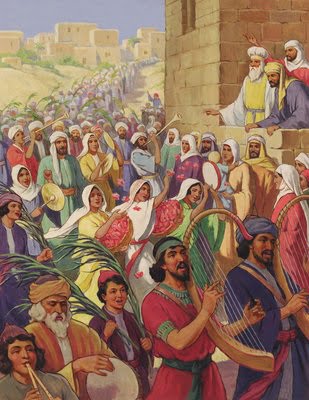by Hannele Ottschofski | 3 December 2019 | Read Part 1 here. Read Part 2 here. When the annual council in 1984 voted that the divisions should be allowed to decide whether to ordain women as elders, some people feared that the church would split. That was not the case. That would not have happened […] Source: https://atoday.org/aseatatthetable/
Wednesday: Sacrifices as Part of Worship
Read Nehemiah 12:43. What was special about offering “great sacrifices” as part of their worship celebration?
Sacrifices were the most essential aspect of worship during the time of the temple. Several different sacrifices were used, either for the promise of forgiveness or to express the joy of fellowship and gratitude to God. Sacrifices provided the substance for worship, as they reminded the worshipers of the truth of God and who He is, and pointed to the Promised Seed, the Messiah, who would sacrifice His life for them, because He is the Lamb of God.
Read John 1:29, John 1:36; 1 Corinthians 5:7; and Revelation 5:6, Rev. 5:12-13. What do they teach us about what the sacrifices ultimately pointed to? If the ancient Israelites could rejoice over a dead farm animal, a death that could reveal only so much truth, how much more reason do we have to rejoice than they had?
Notice, too, how many times the idea of joy and rejoicing appears in Nehemiah 12:43 alone. That is, amid the reverence, and perhaps the godly fear that the people experienced in their worship service (after all, the killing of an animal for their sins was a solemn thing), there was joy and rejoicing, as well. When we approach God, it must be in awe and reverence, as well as with rejoicing. Psalm 95 demonstrates that a true act of adoration involves a summons to sing, shout joyfully, and make music to celebrate God (Ps. 95:1) as well as to bow down and kneel before the Lord (Ps. 95:6). Striving to achieve a balance between joy and reverence is crucial for adoring, praising, and worshiping our Creator.
| When we think that, at the cross, the Creator of all that is created (see John 1:1-3) hung there, dying for the sins of His creation, what emotion do we first experience? What role can, and should, joy also play in our experience of the Cross? |
 (0)
(0) Source: http://feedproxy.google.com/~r/SabbathSchoolNet/~3/x1ZLAiErk5c/
Jamaican Adventist Church for the Deaf in Media Spotlight
3 December 2019 | An Adventist congregation in Jamaica was recently featured in the premier newspaper in the country. The Jamaica Observer spotlighted the unique worship environment in the denomination’s Deaf Church in St. Catherine, southeast Jamaica, which started four years ago and now has an attendance of 35 to 40 worshipers per weekend. The […] Source: https://atoday.org/jamaican-adventist-church-for-the-deaf-in-media-spotlight/
Tuesday: Two Large Thanksgiving Choirs
Read Nehemiah 12:31-42. Why was music such an important part of this celebration?
Part of the worship service in Nehemiah’s time was creating two thanksgiving choirs that walked around Jerusalem singing, accompanied by instruments. They started in the same place and then split off, each going in a different direction around the walls of the city. One group was led by Ezra, who was at the front, and the other group had Nehemiah at the back.  The two choirs met up once again at the Valley Gate and from there proceeded into the temple. Priests who blew the trumpets complemented each procession. Once the choirs entered the temple, they stood facing each other. It was an excellently organized procession and worship service.
The two choirs met up once again at the Valley Gate and from there proceeded into the temple. Priests who blew the trumpets complemented each procession. Once the choirs entered the temple, they stood facing each other. It was an excellently organized procession and worship service.
To answer why music is such an important part of the celebration and worship service, we have to look at its meaning in the context of the temple. Music in the temple was not a concert that people came to enjoy, like going to listen to Beethoven’s 4th symphony being performed at a concert hall. Rather, as the musicians sang and played the instruments, the people bowed in prayer. It was part of their worship.
The central act of the temple and worship concerned sacrifices, itself a rather unpleasant action. After all, what were they doing but slicing the throats of innocent animals? The playing of such beautiful music, in many ways, besides just lifting the people’s thoughts heavenward, helped make the whole worship experience more pleasant.
Look up instances in the Bible where music was an important aspect of worship. Reflect especially on Exodus 15:1; 2 Chronicles 20:21-22; and Revelation 15:2-4.
Both on earth and in heaven, music is part of the worship experience. Notice that in the above verses, the singing is all about what the Lord has done for His people, including giving them victory “over the beast” (after all, how else would they have gotten that victory?). It’s praise to God for His acts of salvation.
| Name some of the things that God has done for you that are good reasons to sing praises to Him? |
 (0)
(0) Source: http://feedproxy.google.com/~r/SabbathSchoolNet/~3/SDFezCai-5M/
Part 2: How We Got Where We Are Today
by Hannele Ottschofski | 2 December 2019 | Read Part 1 here. The current discussion about the ordination of women has been going on for over 50 years. Many books and articles for and against it have been written, and various commissions have studied thoroughly what the Bible says about the question, most recently by […] Source: https://atoday.org/how-we-got-where-we-are-today/

